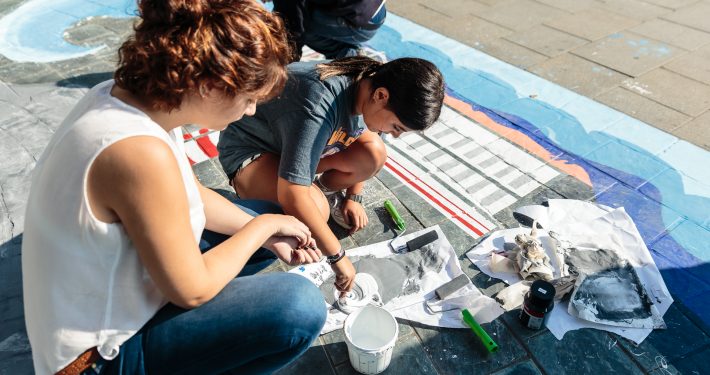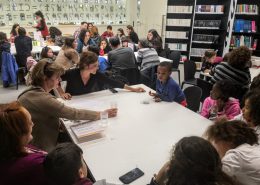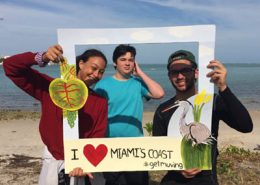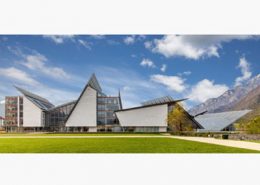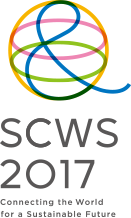By Tomas Rehacek, Ecsite, and Manuel Cira, Nausicaá National Sea Center
Goal 14: Conserve and sustainably use the oceans, seas, and marine resources for sustainable development
The World Ocean plays a fundamental role in the world’s ecology, climate control, sustenance, public health, and sustainable development. Despite this indispensability, oceans and seas have been under growing pressure due to overpopulation, overconsumption, overfishing, and waste mismanagement. Even though they are still fulfilling the functions we depend on, their overall capacity to absorb global anthropogenic changes is slowly petering out. Just ask yourself, “How many people are aware of the services the ocean provides? How many know the impacts they have on the ocean and their own ability to act more sustainably?” After all, our planet is 71% water, so one would think that these links are fairly easy to form. Unfortunately, the truth is far from that.
Apart from coastal dwellers, many of us are not in contact with the oceans or seas other than perhaps during a brief period of summer vacation. And while this physical distance can be surmounted, our mental and cognitive detachment is a much bigger hurdle to overcome. In response to this lack of awareness coupled with the mounting challenges faced by marine ecosystems, a consortium of 20 partners, including five museums, three science centers, and one aquarium from the Ecsite network, came together to develop and implement a project to bridge the gap between inland and coastal zones by promoting the importance of the services the World Ocean provides us and forging new strategies for sustainable use of these services. Funded by the Seventh Framework Programme of the European Union and led by Nausicaá National Sea Centre in France, the Sea for Society project zeroed in on a number of problems, such as a lack of public awareness and empowerment; improving research and development and marine and maritime governance; and facilitating a dialogue and cooperation among a range of stakeholders with disparate and sometimes contradictory interests in 11 European countries and Israel.
Having unique access to the general public and a myriad of diverse stakeholders is often quoted as one of the essential strengths of science centers and museums. Drawing on this, the partner science centers and museums undertook a central role in the project by organizing nearly 40 consultation forums in France, Greece, Ireland, Italy, Norway, Poland, Portugal, Spain, and Sweden, representing specific maritime regions of Europe. The objective was to engage stakeholders, citizens, and young people on the key issues of the project in order to ensure a participatory approach. Structured as stakeholder and citizens/youth consultations, the results amounted to more than 700 challenges to the development of a sustainable marine ecosystem, the most prevalent of which was “lack of awareness and unfounded attitudes”. To tackle these, numerous educational programs and trainings, such as Sea Academies, Science Cafés on marine issues (Blue Cafés), Living Labs, Youth Parliaments, and Open Days were carried out to advocate for a collective vision for sustainable marine environments—these programs generated roughly 650 proposed solutions. The Ecsite members were also instrumental in the mobilization phase, which set out to activate and empower other stakeholders, such as, researchers, decision makers, educators, and civil society organizations at the local and European level. All these activities spearheaded efforts to establish “Blue Society”, a concept which factors in multiple perspectives and integrates social, cultural, economic, ecological and political dimensions. Furthermore, the concept encourages political leaders and citizens alike to take an active role in stewardship and includes all stakeholders in implementing solutions to critical issues affecting the world’s oceans and coasts. Having been officially introduced at the project’s final event in the European Parliament in November 2015, the concept has been backed up by thousands of citizens who signed the Citizens’ Promise charter, as well as by many organizations signed on to the Blue Society Stakeholder’s Commitment.
The Blue Society concept has inspired new initiatives in the field of education, knowledge sharing, knowledge transfer, and innovation in connection with Blue Growth. As do other initiatives advocating for sustainable behavior, it strives to change people’s mindsets and values which are prerequisites for a sustainable future. Science centers and museums stand at the forefront of this endeavor and do their bit by employing powerful tools of science education and public engagement, which hold a lot of potential for a societal change. Their expertise and experience proved to be conducive to the success of the Sea for Society project, which fit in with an ambitious goal that has fostering a vision embracing the spirit of sustainability, well-being, and equity for humankind as its guiding principle.
All in all, the project’s achievements speak loud and clear! Once again, a European initiative with global reach and ambitions stands firmly on the shoulders of science education and public engagement. And while we cannot change the world overnight, putting one foot in front of the other on the path towards sustainability is a responsibility we cannot forego.

